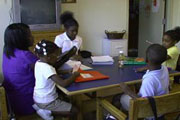VOA标准英语2011--US Charities Endure Hard Times(在线收听)
US Charities Endure Hard Times
For the first time in her life, Jameka Usher is homeless. Since April, when the family was evicted, she and her four children have been living in rooms provided free by the Salvation Army. The Ushers are among America's large and growing class of working poor, who don’t earn enough to support their family.
"It wasn't like it was just me. I have four little ones following and looking up to me," Usher says. "So, it was scary. I felt like I didn't have anywhere to turn to."
The last few years of economic upheaval have been scary for a lot of Americans, as well as for the non-profit agencies that serve them. The Nashville command of the Salvation Army has seen a four-fold increase in requests for help.
That's unprecedented in Lt. Colonel Charles White's 45-year career with the charity. “Had someone the other day just come into our office here and say, 'I'm embarrassed to be here. Last year I was contributing to the Salvation Army, but now I'm coming to the Salvation Army to ask for help myself.'"
And just as more families like the Ushers are asking for housing and other help, benevolent agencies are seeing a downturn in charitable donations and government assistance. White says Nashville recently lost a $400,000 federal grant, and he fears more cuts are ahead.
"We understand the need to balance the budget, but we also see the direct impact that has here on the street, at the local level, on families and on individuals who have no place to turn other than the Salvation Army and agencies like us."
Second Harvest Food Bank, also in Nashville, provides free meals to more than 400,000 Tennesseans each year. Like the Salvation Army, Second Harvest has seen a dramatic increase in requests for help, and an equally dramatic downturn in donations.
"Federal and state funding dollars are shrinking," says the food bank’s Tasha Kennard. "Donors are experiencing fatigue because they've helped pitch in during this great time of need over the past three years, and they're at a point when they may not be able to give at higher levels any longer."
And that has agencies like Second Harvest and Salvation Army worried, because the last two months of the year are traditionally a time Americans make their largest charitable donations.
"During November and December, our food bank raises 60 percent of the necessary funds and food to provide 14 million meals to this community on an annual basis," Kennard says. "So we've got to raise nine million meals in 60 days. For us that is a huge challenge."
That challenge has had some positive effect.
 |
| Homeless for the first time, Jameka Usher is among America's growing class of working poor, not earning enough to support her family. |
"We've had to be innovative. We've had to be more collaborative than ever before," Kennard says. "So our organization has grown drastically in terms of our ability to serve this community in ways we never thought possible and we're proud of that."
Jameka Usher is feeling some pride as well. She recently completed her high school education and is now taking classes on financial management. She’s even seen positive changes in her children.
"They realize now that you cherish what you have and you don't take it for granted. And I think that's going to take us a long way. Actually, I think this place has brought us closer."
Usher says her family has also learned patience. It’s a trait that they, and the charities that serve them, will likely call on often as the American economy recovers at a glacial pace.